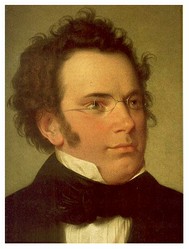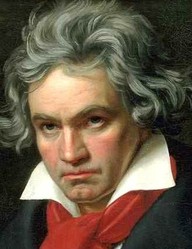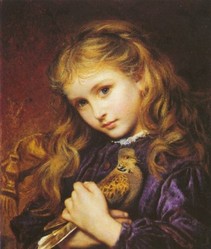Whether you are listening to one of Schubert's well-known "Lieder" (songs) such as "Erlkönig" (The Elf King), to one of his symphonies (such as the Unfinished Symphony) or chamber music, you will be captivated by this composer's expression of Romantic emotion embedded in pure melodies.

Schubert: The Genius Who Composed the Unfinished Symphony
Schubert was one of the great Romantic composers, who was especially famous for his songs. Often underlying his lyrical melodies was a characteristic melancholy.
Life of Franz Schubert
Franz Schubert was born in Vienna, Austria, in 1797. His father was a schoolmaster and Franz was the twelvth of fourteen children in the family.
Having showed great musical talent from an early age, in 1808 Schubert, then 11, joined the chapel choir school that trained singers for Vienna's imperial court.
In 1813 he left the school and began composing. In the following year, he started teaching at his father's school to earn a living -- while at the same time continuing his composing. In 1816 he stopped his school teaching for a year. After that, he became a music master in the household of Count Esterhary in Hungary.
In these early years Schubert composed an opera, some masses, and the first of his Lieder (songs for solo voice with accompaniment, often on the piano), such as "Gretchen at the Spinning Wheel", "Erlkönig" (Elf King), "Heidenröslein" (Hedge Rose), "To the Moon", "Kennst du das Land?" (Knowest Thou the Land?), and "The King of Thule". These songs -- more than 600 in all -- were often music settings for verses from great writers such as Goethe, Schiller, Heine, Klopstock and Shakespeare.
Together with the operatic baritone, Johann Michael Vogl, Schubert set the Scubertiaden, private and public concert parties and receptions where he performed his songs.
He composed choral music. He composed his "Trout" Piano Quintet (1819) and a series of important symphonies -- No. 4 (1816), No. 5 (1816) and No. 6 (1818). His great Symphony No. 8 (the "Unfinished) was written in 1822. Yet another key symphony, No. 9 (the "Great") was written 1825-28) but its importance was unrecognized for many years.
He also wrote much other music for the piano, including sonatas and dances, and much chamber music.
For much of his life Schubert was not well off financially -- in fact, he led a "hand to mouth" existence. He never married. However, he was a sociable and convivial person surrounded by many friends for whom he often sang and played.
In his later years he also suffered ill health and failed to obtain paid positions. However, he did receive some recognition and was able to meet Beethoven, who admired his work. He died in 1828 of typhoid fever at the young age of just 33 (it is said that he was the shortest-lived of all the great classical composers, living a shorter life even than Mozart who died at age 39).
Erlkönig (song)
Music by Franz Schubert; words by Johann Wolfgang von Goethe
Schubert's Musical Works
Symphonies
10 symphonies, including:
-- the incomplete No. 8 in B minor (the "Unfinished")
-- No. 10 in C major ("The Great")
Music for Chamber Ensemble
Including: Piano quintet in A (The Trout Quintet)
Piano Solo
Including: 21 sonatas; 4 Impromptus; 6 Moments musicaux
Piano, Four Hands
Including: 3 Marches militaires; the Grand Duo; Fantasia in F Minor
Songs
Song cycles:
Die schöne Müllerin ("The Fair Maid of the Mill") cycle (1823)
Winterreise ("Winter Journey") (1827)
Schwanengesang ("Swan Song") (posthumous collection)
plus: many song sets and individual songs (some which have been mentioned above).
Liturgical and Sacred Compositions
Numerous masses
Oratorio
Lazarus (1820)
Kennst du das Land? (song)
Music by Franz Schubert; words by Johann Wolfgang von Goethe
The Heritage of Franz Schubert
Schubert wrote within the Viennese tradition of Haydn, Mozart and Beethoven. With Schubert this tradition was to reach its zenith.
He brought a great gift of melody to his works.
Schubert was described by Franz Liszt was "the most poetic of musicians". Schubert's lyricism -- as seen in his more than 600 songs -- has never been bettered. Under him the song as an art form reached its full flowering. He was the creator of the 19th century Lieder tradition.
Schubert influenced such following composers as Bruckner and Mahler.
Schubert's 8th Symphony (the "Unfinished")
Touching scene from Kurosawa's 1947 film, One Wonderful Sunday, featuring Schubert's 8th Symphony ("Unfinished")
Masako tries to lift Yuzo's spirits by summoning the illusion of a live orchestra before him...
Schubert on the Internet
Franz Schubert Quotations
What Schubert said and what people said about him.
Schubert Society of the USA
Articles on Winterreise and other Schubert topics.
Schubert - Lieder
Complete scores of Schubert's famous Lieder (songs).
More Classical Music
You might also like
Beethoven: The Genius Who Composed The Moonlight SonataLudwig van Beethoven is probably the best known composer of classical music. ...
Music Book Review: Handel's Bestiary by Donna Leon, With CD of...Handel's Bestiary by mystery writer Donna Leon brings together a CD of one an...









 Ancient Rome: History and Heritageon 02/28/2012
Ancient Rome: History and Heritageon 02/28/2012
 Ancient Greece: History and Heritageon 10/14/2012
Ancient Greece: History and Heritageon 10/14/2012
 Schumann: The Genius Who Composed Scenes From Childhoodon 04/29/2012
Schumann: The Genius Who Composed Scenes From Childhoodon 04/29/2012
 Mahler: The Genius Who Composed the Resurrection Symphonyon 03/04/2012
Mahler: The Genius Who Composed the Resurrection Symphonyon 03/04/2012



Comments
Yes, John, what a great combination: a Kurosawa movie and a Schubert symphony!
I love the Kurosawa video!